In today’s world, energy efficiency is more important than ever. Not only does it help protect the environment, but it also saves businesses a significant amount of money in the long run. Especially in the wake of rising energy costs across the UK.
Whether you’re a small start-up or a large corporation, implementing energy-saving measures can have a profound impact on your bottom line. In this blog, we’ll explore 14 energy-saving tips for businesses to boost efficiency and reduce costs.
At Falcon Energy, we recognise the significance of energy and cost savings for property and business owners. That’s why we offer a comprehensive range of services, including expert advice and consultation, please don’t hesitate to contact us on 01403 253439 to discuss your needs.
1. Upgrade lighting to LEDs
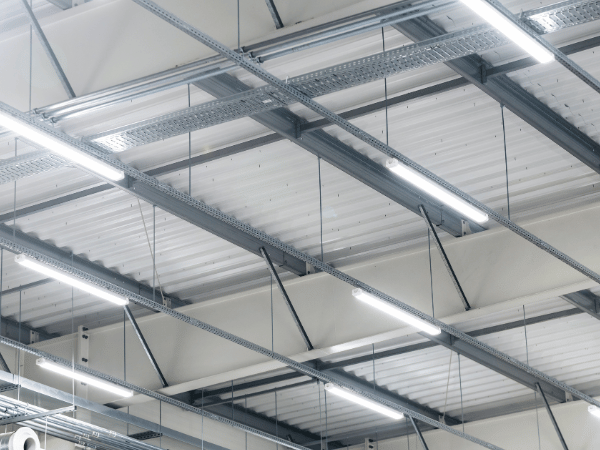 One of the easiest ways to reduce energy consumption is by upgrading your lighting to energy-efficient LEDs.
One of the easiest ways to reduce energy consumption is by upgrading your lighting to energy-efficient LEDs.
One of the standout features of LED lighting is its impressive lifespan. LEDs have an average operational life of around 25,000 to 50,000 hours, which is significantly longer than traditional bulbs. This longevity means that LED bulbs may last up to 25 times longer; for a business, this translates into reduced maintenance costs and less frequent replacements, saving both time and money in the long run.
LED lighting is also eco-friendly as it consumes less energy and contains no hazardous materials, such as mercury, which is found in fluorescent bulbs. By switching to LEDs, your business can contribute to a greener planet and demonstrate its commitment to sustainability.
2. Install occupancy sensor lighting controls
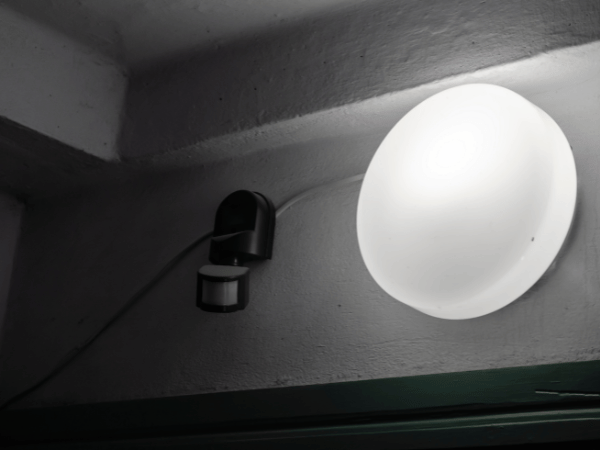 Occupancy sensors are a smart addition to your lighting system. They automatically turn lights on when someone is in a room and off when it’s vacant, preventing unnecessary energy waste.
Occupancy sensors are a smart addition to your lighting system. They automatically turn lights on when someone is in a room and off when it’s vacant, preventing unnecessary energy waste.
Beyond energy savings, occupancy sensors enhance the overall user experience within your workspace. Employees and visitors no longer need to fumble for light switches or worry about leaving lights on inadvertently. The system’s automatic nature ensures that lighting is always available when needed, creating a more comfortable and user-friendly environment.
3. Seal air leaks around doors, windows, ductwork
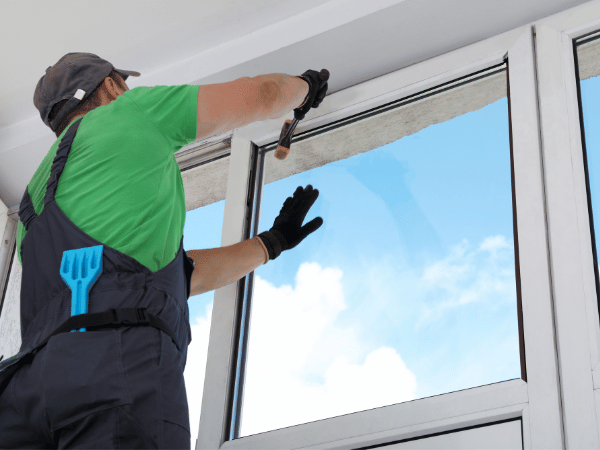 Having air leaks around your doors, windows, or ductwork can result in energy loss, making your heating and cooling systems work harder than necessary. It’s important to find and seal these leaks in order to help maintain a comfortable temperature inside your building while also reducing your business energy consumption.
Having air leaks around your doors, windows, or ductwork can result in energy loss, making your heating and cooling systems work harder than necessary. It’s important to find and seal these leaks in order to help maintain a comfortable temperature inside your building while also reducing your business energy consumption.
4. Add insulation where needed
Another way to significantly reduce your business’ heat loss in the winter months and add to your heat gain in the summer is to improve your insulation. Having proper insulation will ensure that your heating and cooling systems are operating efficiently and not producing wasted energy.
5. Service boilers and radiators regularly
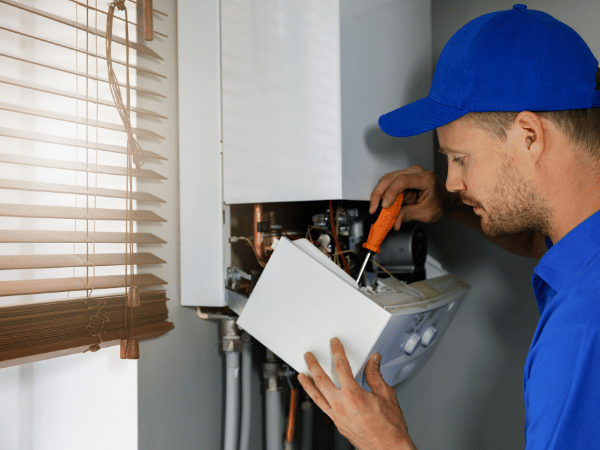 Efficient heating is vital for a comfortable workspace, but over time, heating equipment can become less efficient, leading to higher energy consumption and costs. Regular maintenance of boilers and radiators is essential to keep them running efficiently.
Efficient heating is vital for a comfortable workspace, but over time, heating equipment can become less efficient, leading to higher energy consumption and costs. Regular maintenance of boilers and radiators is essential to keep them running efficiently.
There are a few factors that can prevent your boiler/radiator from working efficiently:
- Accumulation of Dirt and Debris: Heating equipment can collect dirt and debris, hindering heat flow and increasing energy use.
- Corrosion: Corrosion can damage the system, causing leaks and reduced efficiency.
- Malfunctioning Components: Faulty components like thermostats or pumps can lead to inefficiency.
Scheduling regular maintenance can help to prevent and fix these issues, extending the safety and lifespan of your heating.
6. Adjust heating set points
Optimise your heating system by setting the temperature to a comfortable yet energy-efficient level. Lowering the thermostat by just a few degrees can result in noticeable savings.
Achieving the ideal temperature in your workspace requires a thoughtful approach. Start with a comfortable baseline temperature. Consider factors like occupancy and activity levels, and use programmable thermostats to schedule temperature adjustments. You can also encourage layered dressing for your employees during the colder months.
Even small temperature adjustments can lead to noticeable savings on your utility bills. Additionally, conserving energy through temperature optimisation can actually extend your equipment’s lifespan, costing you even less money in the long run.
7. Install a programmable or smart thermostat
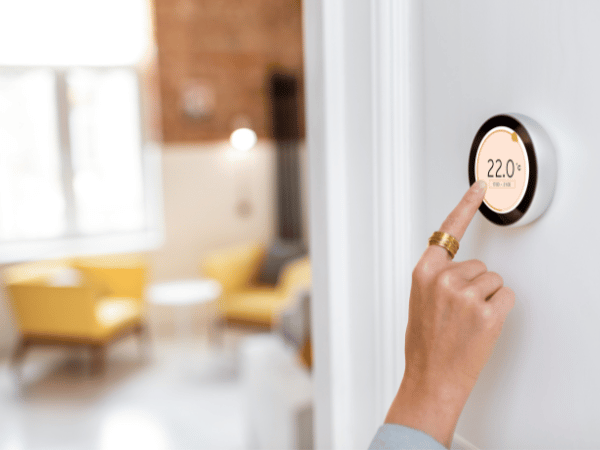 Installing a programmable or smart thermostat will allow you to schedule such heating and cooling cycles based on your business’s needs. This will prevent any unnecessary energy use during non-business hours.
Installing a programmable or smart thermostat will allow you to schedule such heating and cooling cycles based on your business’s needs. This will prevent any unnecessary energy use during non-business hours.
8. Add secondary glazing to windows
Secondary glazing involves adding an additional layer of glass to existing windows, providing better insulation. This brings several advantages, such as improving insulation, reducing heat transfer, minimising noise, and boosting energy efficiency.
By enhancing insulation, you will reduce the need for heating and cooling. This translates into energy savings and lower utility costs. Additionally, it acts as a noise barrier, making your workspace quieter and more comfortable.
9. Add timers or smart controls on hot water heaters
Hot water tanks are a significant source of energy consumption. Installing timers or smart meters will ensure that hot water will be available only when it’s actually needed, therefore reducing the amount of energy wasted. This will not only save your business from needlessly wasting energy, but it will also save money.
10. Choose energy-efficient appliances and electronics
When looking for new appliances and electronics for your business, try to opt for energy-efficient models. Numerous brands offer energy efficient equipment that is designed to consume less energy with its usage. Although such appliances might fetch a bigger cost initially, you will save money in the long run.
11. Switch to sleep settings for computers and monitors
 Encourage your employees to enable sleep settings on their computers and monitors if they haven’t already done so. This is one of the easiest energy efficiency improvements, and it will ensure that your computers will consume less energy when not in use.
Encourage your employees to enable sleep settings on their computers and monitors if they haven’t already done so. This is one of the easiest energy efficiency improvements, and it will ensure that your computers will consume less energy when not in use.
12. Reduce “phantom” load from plugged-in devices
Phantom energy drain occurs when devices draw power even when turned off. This subtle energy waste can add up. Two simple steps to combat it:
- Power Strips: Use power strips with switches to turn off multiple devices at once when they’re not in use.
- Unplugging: For less frequently used devices, consider unplugging them to eliminate standby power consumption.
These actions save on energy costs, promote eco-friendliness, and extend device lifespans. Educate your team to maximize the impact.
13. Schedule an energy audit to identify savings opportunities
Consider scheduling an energy audit for your business. Professionals can pinpoint areas where energy-saving improvements can be made, providing a roadmap for energy efficiency.
At Falcon Energy, we are able to run numerous energy efficiency tests on your commercial property. Please call us on 01403 253439 for energy efficiency advice for your business.
14. Take advantage of rebates and incentives for upgrades in the UK
The UK government offers various rebates and incentives to encourage businesses to adopt energy-saving measures. Research into the advantages of these programs and enrol in the ones that suit your business and its needs, this will help you offset the cost of upgrades and maximise your savings.
Commercial Energy Saving
Incorporating these energy-saving tips into your business operations not only reduces your environmental footprint but also lowers operational costs, ultimately boosting your bottom line. So, start implementing these measures today and watch your energy bills shrink while your efficiency grows.
Start boosting your business’s energy savings with our specialist team at Falcon Energy. Give us a call on 01403 253439 for a free consultation, we offer a wide range of services such as SAP assessments, EPC certifications, air testing, sound testing, and sustainability statements.
